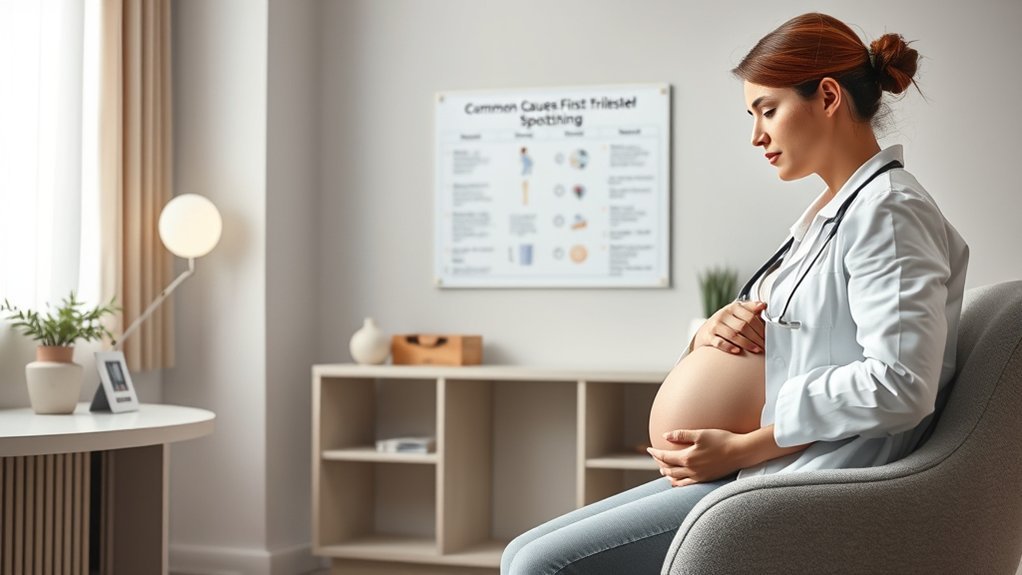It’s interesting how many women experience spotting in the first trimester, often leading to confusion and concern. While it can be common, understanding how to prevent it is essential for a healthy pregnancy. By focusing on your lifestyle choices, you can considerably reduce the risk. Let’s explore effective strategies that not only support your body but also promote emotional well-being during this critical time.
Understanding Spotting: What It Means for Your Pregnancy

Understanding spotting during the first trimester can be confusing and concerning for many expectant parents.
It’s important to recognize that spotting can sometimes occur as your body adjusts to pregnancy. While it can be alarming, it’s not always a cause for panic. Many women experience light spotting without complications. This can happen as the embryo implants into the uterine lining or due to hormonal changes.
However, it’s vital to monitor the color, amount, and duration of the spotting. If you notice anything unusual or if it’s accompanied by pain, reaching out to your healthcare provider is essential. They can help assess your situation and provide the reassurance you need, ensuring you feel supported during this significant time in your life.
Common Causes of Spotting in the First Trimester

Spotting in the first trimester can stem from various causes, and it’s important to understand them.
You might experience implantation bleeding, which occurs as the embryo attaches to the uterine lining.
Additionally, hormonal changes and signs of ectopic pregnancy can also contribute to spotting, so being aware of these factors is essential for your peace of mind.
Implantation Bleeding Explained
Since many women experience spotting during the first trimester, it’s important to recognize that implantation bleeding can be a common cause.
This light spotting occurs when a fertilized egg attaches to the uterine lining, typically around six to twelve days after conception. You might notice a slight pink or brown discharge, which can last from a few hours to a couple of days.
Unlike menstrual bleeding, it’s usually lighter and doesn’t involve clots. Understanding this process can help alleviate concerns, as implantation bleeding is generally considered normal.
However, if the bleeding is heavy or accompanied by severe cramping, it’s essential to consult your healthcare provider to rule out other issues. Your peace of mind is important during this significant time.
Hormonal Changes Impact
Hormonal fluctuations during early pregnancy often contribute to spotting. As your body adapts to the surge of hormones like progesterone and estrogen, these changes can affect the uterine lining and lead to light bleeding. This is particularly common during the first trimester when your body is evolving to support the developing fetus.
Additionally, the cervix becomes more sensitive and can bleed easily due to increased blood flow, especially after intercourse or a pelvic exam. While spotting can be alarming, it’s often a benign occurrence linked to these hormonal shifts.
However, it’s essential to monitor your symptoms and consult your healthcare provider if you have concerns, as they can offer guidance and reassurance during this sensitive time.
Ectopic Pregnancy Signs
What should you be aware of when it comes to ectopic pregnancy signs during the first trimester? Ectopic pregnancies occur when a fertilized egg implants outside the uterus, often in a fallopian tube.
You might experience sharp, localized abdominal pain, especially on one side. Spotting or unusual vaginal bleeding can also occur, which may be accompanied by dizziness or fainting.
If you notice these symptoms, it’s essential to seek medical attention promptly. Early diagnosis can prevent serious complications.
When to Seek Medical Attention

When should you consider seeking medical attention for spotting during the first trimester?
It’s crucial to stay vigilant and reach out to your healthcare provider if you experience any of the following symptoms:
- Spotting accompanied by severe abdominal or pelvic pain
- Bright red blood or heavy bleeding that fills a pad in an hour
- Passage of tissue or clots
- Symptoms of infection, such as fever or chills
- A persistent feeling of dizziness or faintness
These signs may indicate a more serious issue, and prompt evaluation can make a difference.
Trust your instincts; if something feels off, don’t hesitate to contact your provider. Your health and your baby’s well-being are the top priorities.
Lifestyle Changes to Reduce Spotting Risk
To reduce the risk of spotting during your first trimester, it’s crucial to focus on healthy diet choices and effective stress management techniques.
Incorporating nutrient-rich foods can support your body, while practicing stress relief methods can help maintain emotional well-being.
Healthy Diet Choices
While managing the first trimester of pregnancy, making healthy diet choices can greatly impact your overall well-being and potentially reduce the risk of spotting.
Focus on incorporating nutrient-rich foods that support both your body and your developing baby. Here are some healthy diet choices to take into account:
- Leafy Greens: High in folate, which is essential for fetal development.
- Lean Proteins: Supports tissue growth; opt for chicken, fish, or legumes.
- Whole Grains: Provides essential fiber and energy; choose brown rice or quinoa.
- Fruits: Rich in vitamins and antioxidants; berries and citrus are excellent options.
- Healthy Fats: Incorporate avocados or nuts for heart health.
Stress Management Techniques
Managing stress is essential during the first trimester, as it can considerably influence your overall health and potentially reduce the risk of spotting.
To effectively manage stress, consider incorporating relaxation techniques such as deep breathing exercises, meditation, or gentle yoga into your daily routine. These practices can help calm your mind and promote emotional well-being.
Additionally, prioritize sleep by establishing a consistent sleep schedule and creating a serene sleeping environment. Engaging in regular, moderate exercise can also alleviate stress while enhancing your mood.
Connecting with supportive friends or family members provides emotional reassurance, so don’t hesitate to share your feelings.
The Importance of Nutrition During Early Pregnancy
Nutrition plays an essential role in early pregnancy, as it directly impacts both your health and the development of your growing baby. Proper nutrition helps reduce the risk of complications and supports your baby’s critical growth stages.
Here are some key nutritional elements to focus on:
- Folic Acid: Reduces the risk of neural tube defects.
- Iron: Supports increased blood volume and prevents anemia.
- Calcium: Builds your baby’s bones and teeth.
- Protein: Essential for tissue growth and development.
- Healthy Fats: Important for brain development and overall health.
Staying Hydrated: How Water Intake Affects Your Body
Adequate hydration is just as essential as proper nutrition during early pregnancy, as it greatly affects your body and the developing fetus. Staying well-hydrated helps maintain ideal blood volume, which is critical for nutrient and oxygen delivery to your growing baby.
Water also aids in digestion, reducing the risk of constipation and bloating, common issues in early pregnancy. You may notice changes in your body’s fluid balance, making hydration even more important to prevent dehydration.
Aim for at least 8-10 cups of water daily, adjusting based on your activity level and climate. Listening to your body’s thirst signals can guide your intake, ensuring you support both your health and your baby’s development effectively.
Managing Stress and Anxiety for a Healthier Pregnancy
While pregnancy can be an exciting time, it often brings stress and anxiety that can impact both your well-being and that of your baby.
Managing these feelings is essential for a healthy pregnancy. Here are some effective strategies you can use:
Managing stress and anxiety is crucial for a healthy pregnancy; consider these effective strategies to support your well-being.
- Practice mindfulness: Engage in meditation or deep-breathing exercises to center yourself.
- Stay active: Regular physical activity can help reduce stress and improve mood.
- Connect with others: Share your feelings with friends, family, or support groups to feel less isolated.
- Establish a routine: Having a daily schedule can provide structure and predictability.
- Prioritize self-care: Make time for activities that bring you joy and relaxation.
The Role of Prenatal Care in Preventing Complications
Stress management is essential during pregnancy, but so is regular prenatal care, which plays a significant role in preventing complications. Attending routine check-ups allows your healthcare provider to monitor your health and your baby’s development closely. These visits often include critical screenings and tests that can identify potential issues early on. By addressing concerns promptly, you can minimize risks and make informed decisions about your care.
Additionally, prenatal care offers you access to invaluable resources and education about pregnancy, nutrition, and self-care. It’s a support system that empowers you to advocate for your health.
Frequently Asked Questions
Can Spotting Affect My Chances of a Healthy Pregnancy?
Spotting can sometimes indicate underlying issues, but it doesn’t always affect your chances of a healthy pregnancy. It’s important to monitor your symptoms and consult your healthcare provider for personalized guidance and support.
Is It Normal to Have Spotting With Multiple Pregnancies?
Sure, it’s normal to experience spotting in multiple pregnancies. Your body’s just playing its own version of hide-and-seek. While it can be common, always talk to your healthcare provider for reassurance and guidance.
How Does Age Influence the Likelihood of Spotting?
As you age, hormonal changes can increase the likelihood of spotting during pregnancy. Older maternal age often correlates with a higher risk of complications, making it essential to monitor any spotting closely and consult your healthcare provider.
Can Exercise Cause Spotting During the First Trimester?
Exercise can sometimes lead to spotting during your first trimester. Imagine your body, a delicate garden, responding to new movements. While it’s generally safe, listen to your body and consult your healthcare provider for reassurance.
Are There Specific Medications That Increase Spotting Risk?
Yes, certain medications, like anticoagulants and nonsteroidal anti-inflammatory drugs (NSAIDs), can increase spotting risk. It’s essential to discuss any medications with your healthcare provider to guarantee they’re safe during your first trimester.
Conclusion
In your journey through the first trimester, remember that nurturing your body and mind is crucial. By prioritizing nutrition, staying hydrated, and managing stress, you’re not only supporting your health but also fostering a safe environment for your baby. Embrace the power of a strong support network and consistent prenatal care, and know that taking these proactive steps can help you navigate this transformative time with confidence and peace. Your well-being matters, and so does your baby’s.
